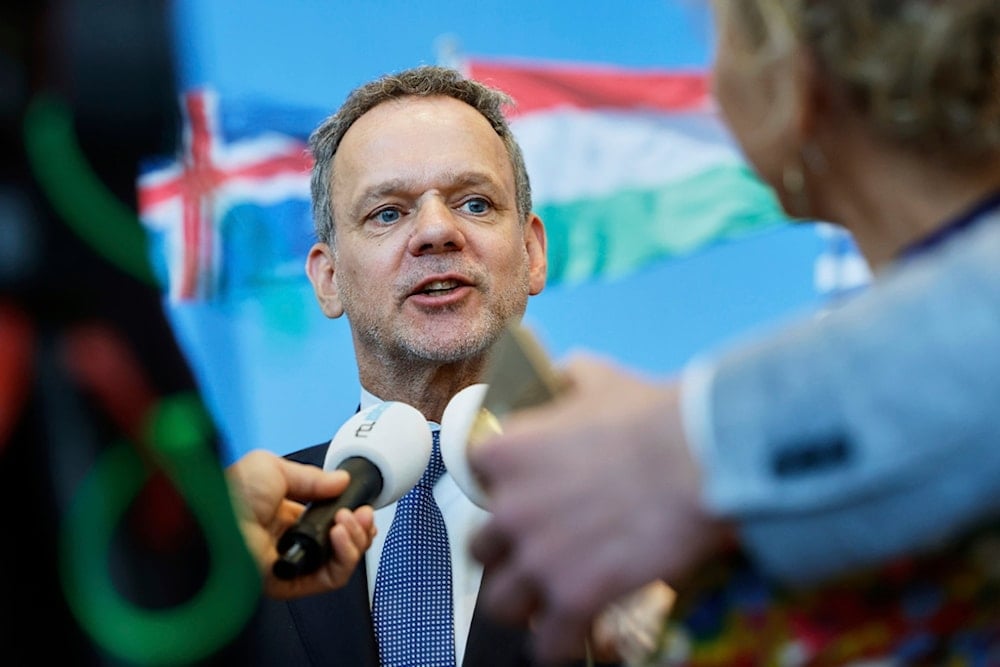Netherlands to urge EU Trade freeze on 'Israel', hold off on Palestine
Despite mounting international momentum and domestic pressure, the Netherlands has declined to formally recognize the State of Palestine.
-

Netherland's Foreign Minister Caspar Veldkamp speaks with the media after a meeting NATO foreign ministers at NATO headquarters in Brussels, Friday, April 4, 2025. (AP Photo/Geert Vanden Wijngaert)
Dutch Foreign Minister Caspar Veldkamp said Thursday he informed Israeli Ambassador Modi Ephraim that the Netherlands will push the EU to suspend the trade component of the Israel-EU Association Agreement, citing growing European outrage over Israeli actions in Gaza.
Veldkamp said that the Netherlands will not, for now, formally recognize the State of Palestine, despite mounting international and domestic pressure to do so.
Speaking during a parliamentary session centered on the escalating crisis in Gaza, Veldkamp laid out the Dutch government's approach to the matter.
"The Netherlands is seeking the establishment of an independent and viable Palestinian state ... A thorough analysis is necessary to determine what this will mean and how it can be achieved. This is a card that can be played only once... Therefore, recognition of the State of Palestine is not what the cabinet of ministers is currently proposing," he stated.
Veldkamp said it is "almost impossible" for "Israel" to receive Dutch-made weapons, as lawmakers pressed the government to tighten the arms embargo over the war on Gaza.
During a parliamentary debate on the humanitarian crisis, several parties urged stricter trade rules and enforcement of the arms export ban. Veldkamp responded that export licenses are under “extremely strict” control, making it highly unlikely for any Dutch weapons to reach "Israel", given the risk of their use in Gaza or the West Bank.
He added that the Netherlands had already tightened restrictions on military and dual-use exports to Israel earlier this year in response to the ongoing conflict.
His remarks come in the wake of a diplomatic push led by France and Saudi Arabia, where foreign ministers from 15 countries called for the formal recognition of Palestine. French President Emmanuel Macron pledged that France will proceed with recognition in September, while the United Kingdom has warned it may do the same unless "Israel" takes concrete action to alleviate the humanitarian catastrophe in Gaza.
The diplomatic push coincides with growing momentum across Europe. In 2024 and 2025 alone, ten countries, including Ireland, Norway, Spain, Armenia, and most recently Slovenia and Malta, formally recognized Palestine, bringing the total to 147 nations globally. Meanwhile, countries such as Germany and Italy have expressed opposition to recognition at this stage, reflecting a divide within the European Union.
Recognition debate intensifies
The Netherlands' decision has not been without controversy at home. Pro-Palestinian sentiment has surged among the Dutch public, with large-scale protests, particularly the "Red Line" demonstrations in The Hague, and student encampments at major universities demanding an end to Dutch complicity in Israeli aggression and a firm recognition of Palestinian statehood.
Calls from figures such as Frans Timmermans have added political pressure on the ruling coalition to reconsider its stance.
Read more: University of Amsterdam halts student exchange with Israeli university
Despite its refusal to recognize Palestine at this time, the Dutch government has taken some limited measures in response to Israeli actions. These include travel bans on two Israeli ministers, although arms imports from "Israel" remain unaffected.
Internationally, the debate over recognition is intensifying. The United States continues to withhold recognition and vetoed Palestine's bid for full UN membership in 2024.
In contrast, Russia has reiterated its support for a two-state solution based on 1967 borders with East al-Quds as the capital, a position consistent with longstanding UN resolutions.

 4 Min Read
4 Min Read








